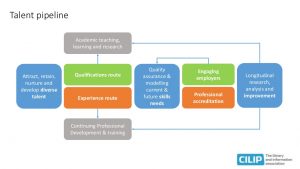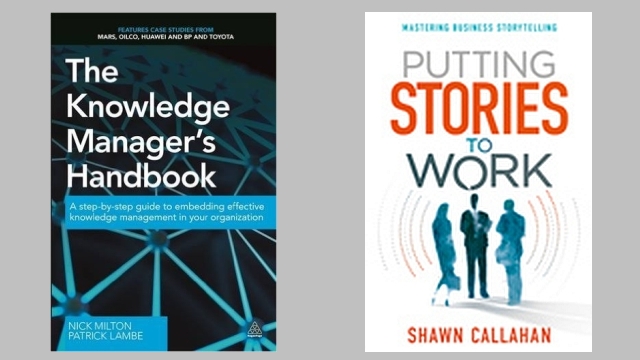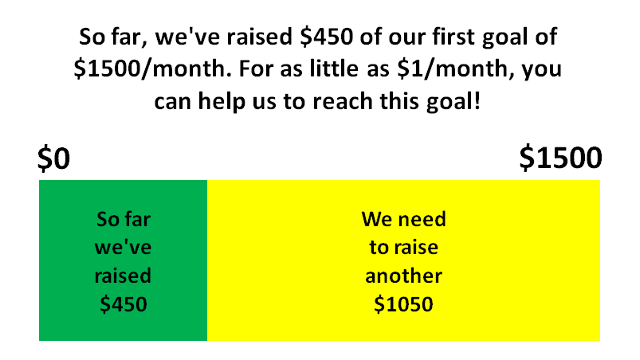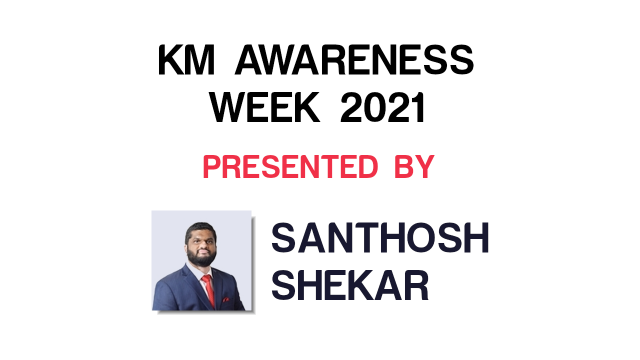
What’s more important for knowledge managers: education, or skills and experience?
This article is part of a series on education and professional accreditation for knowledge managers.
In a recent RealKM Magazine article, I profiled what I consider to be the seven big new things in knowledge management (KM). Two of the big new things are Chartered Knowledge Manager status and comprehensive, accredited knowledge manager education.
In his 15 May presentation on the proposal for Chartered Knowledge Manager status, CILIP CEO Nick Poole identifies both a “qualifications route” and an “experience route” as part of the knowledge and information manager talent pipeline (Figure 1).

Here in RealKM Magazine we’ve strongly emphasized the qualifications route, first publishing Andre Saito’s Educating knowledge managers series and then releasing the RealKM Open KM Syllabus.
However, a recent article in The Straits Times and a subsequent back-of-envelope analysis prompted by it leaves me wondering if the experience route might be just as or even more important, and also realising that the qualifications route and experience route for KM integrate in only one direction. That is, knowledge managers with KM qualifications will very likely also have considerable experience, but many skilled and experienced knowledge managers have no KM qualifications. Skills are developed through experience.
In The Straits Times article, Singaporean Education Minister Ong Ye Kung contends that skills are just as important as degrees. He argues that Singaporeans should stop believing that university education is the only way to develop an individual’s potential, stating:
This could be in the form of a degree, a master’s, a specialist diploma, an accumulation of short courses attained in different phases of your life, or just something that the industry knows you are good at, without any paper qualifications. It is about having a high level of expertise, passion and mastery in a particular area.
He then goes on to recommend an integrated approach:
The traditional view is that a degree is above skills, but that is because when we think of skills in Singapore, we think of vocational skills acquired through polytechnic and Institute of Technical Education courses.
You accumulate knowledge through a degree course, but to convert the knowledge into something useful to society, you require skills. Skills are something that activate your knowledge. From that perspective, skills are above degrees.
The truth is, both are needed – it is a mesh of what you know and what you can do.
However, despite the desirability of having a mesh of both qualifications and experience, my subsequent back-of-envelope analysis shows that the majority of top knowledge managers appear to have no relevant KM qualifications at all, with their qualifications instead being in other fields. For this analysis, I looked at the four individuals from the top five in the 2013 MindTouch list of 100 top 100 KM influencers – David Gurteen, Dave Snowden, Stan Garfield, and Nancy White. All four are well-known thought leaders in the KM community and have very considerable experience, but from their LinkedIn profiles, none has relevant KM qualifications. Their qualifications are:
- David Gurteen – Bsc in Applied Physics from Coventry University.
- Dave Snowden – MBA in Financial Management from Middlesex University; BA in Philosophy from Lancaster University.
- Stan Garfield – BS in Applied Mathematics and Computer Science from Washington University in St. Louis; Journalism and Computer Science from Northwestern University.
- Nancy White – BA in Botany from Duke University.
Broadening out to encompass the individuals in the top ten of the MindTouch list, it appears that just one of the eight individuals has qualifications relevant to KM. This is Alice MacGillivray, who is very well qualified and also has very considerable experience (her qualifications being a PhD in Human and Organizational Systems from Fielding Graduate University; Certificate in Dialogue, Deliberation & Public Engagement from Fielding Graduate University; MA in Human Development from Fielding Graduate University; MA in Leadership from Royal Roads University; and BGS with great distinction from Athabasca University).
While my analysis is in no way scientific, it suggests that a large proportion of top knowledge managers have reached this level through following an experience-only route, and that this is a very positive rather than a negative thing.
Given this indication, a more comprehensive analysis of the qualifications of a wide range of knowledge managers should be undertaken. Depending on the outcome, consideration will potentially need to be given to placing an equal or possibly greater emphasis on the experience-only (not just experience) route in the Chartered Knowledge Manager status.
Header image source: Shahid Abdullah on Pixabay, Public Domain.
Also published on Medium.







This is a great question. I’m planning to do some independent research on those who self-identify as doing some kind of knowledge management and survey on tasks, salary, job title, reporting structure, memberships, and quals. I want to conduct this annually, beginning in APAC, but expanding out. Grand ambitions?!
I’m one of those people with experience, rather than education, though I have half a B.Arts (knowledge & learning minor) and am a certified Knowledge Centered Service Trainer, which is a professional development qual.
I think KM has a strong experience component, simply because it’s often developed with contextual relevance, so an architect may become a KMer for the AEC industry, simply through their own frustration and self-guided learning, like that exemplified by Chris Parsons of Knowledge Architecture.
Many thanks Aprill for a great comment – I think your proposed research would be most valuable.
I’m also one of those with experience rather than KM education, with that experience gained in the context of bringing together and integrating diverse sources of knowledge in environmental decision-making.
I’d love to gain some KM qualifications, but the single biggest obstacle is the cost, primarily in regard to lost income during the period of study. I was given a PhD offer in 2014, but sadly was unable to take it up because even though I was successful in obtaining a scholarship and a small top-up it wasn’t enough for me to survive on for three years, particularly with the scholarship requirements ruling out any consulting or part-time work in that three years.
I know of others who have been in similar situations. To address this, I think we need to look not just at what we teach in KM education, but also how KM courses are financed and structured. For example, could business and industry be more actively involved in KM education partnerships?
Bruce & April,
you may find the follwing Linkedin pro-education discussion on “Can anyone do Knowledge Management?” from 2012 useful. It was re-posted just recently by Elmi Bester (see “Comment”)
https://kmeducationhub.de/can-anyone-do-knowledge-management/
An other one is a 2015 survery by David Griffiths where he states and asks “62% of Knowledge Managers don’t hold a KM qualification – problem?”
https://kmeducationhub.de/hold-specialist-knowledge-management-qualification-survey-findings/
Also in 2015 myself discovered Linkedin to find out that “12K+ LinkedIn members studied [Knowledge Management]”
https://kmeducationhub.de/knowledge-management-12k-linkedin-members-studied-this/
Rather that twitter, Linkedin or any other business network may be a more appropriate source to do research on this issue, April. You should also not discover “thought leaders” but “real practitioners” like CKOs, on-the job knowledge managers, and the like. (Btw. I’m also on this twitter list. Twice! No formal KM education ;-))
Anyway, it is not useful to ask which is more important, Bruce. This does not help anybody. You can argue for and against both. At the end of the day it is what you make out of your KM education and/or skills and experience. The fact that at the moment skills and experiences come before formal KM education reflects the current sate of the discipline. We’ll see if the Chartered Knowledge Manager can become a real educational option or just a training from a local society of library and information professionals.
April, if you need any help on your independent research don’t hesitate to contact me.
Boris – initiator of the KMedu Hub, https://kmeducationhub.de
Thanks for the extra background and further links, Boris. I will definitely be leveraging networks like the ACTKM list and other similar sources for the experiences of practitioners, and sourcing introductions to CKOs for one-to-one conversations. I guess now that I’ve made myself accountable, I better get onto producing something! 😉
You’ll not have luck with the actKM list. After a long time of silence it recently went offline. Also the whole actKM website, which you can still access via the wayback machine (https://web.archive.org/web/20180325070502/http://actkm.org/) Interestingly actKM is still listed as one of the communities comprising AusKM, in fact it was replaced by AusKM in 2015 (http://www.auskm.org)
AusKM has a linkedin group. (https://www.linkedin.com/groups/89606) Maybe you’ll try your luck there, but you should note that Linkedin groups in general are for a long time no more a place to discuss and ask for support.
Thanks Bruce, Aprill and Boris,
In KNOWledge SUCCESSion I explore Capabilities from three aspects: Knowing (Knowledge and Experiences), Doing (Skills and Talents) and being (Behaviours and Attitudes). The extension of this is the journey we are on, which is “Becoming”. We are all on an ongoing journey which generally gains in each of these areas to build more capabilities. In my own professional career (which has included over 20 years in “KM” in industry, and ten years actually facilitating KM learning at postgraduate level in formal education programs), I believe I have developed more “knowledge capability” for DOIING KM than I have from formal learning about it. I believe it is important to recognise both paths towards becoming a knowledge professional and will discuss that in an article in this magazine in the near future.